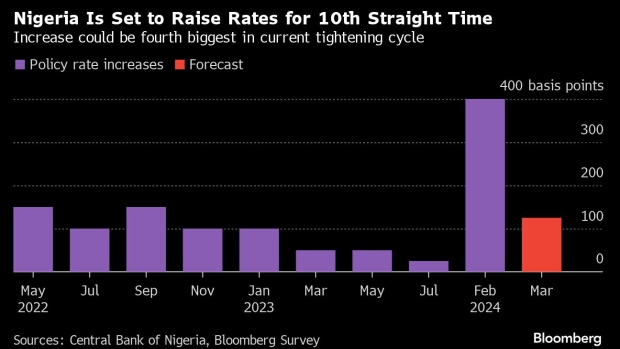Nigeria set for another outsized rate hike to crush inflation
Inflation quickened to 31.7% last month — more than triple the 9% ceiling of the central bank’s target range — due to a sharp slump in the naira. Authorities have devalued the naira twice since June to allow the currency to trade more freely and close the gap with the unofficial market rate, as part of reforms to attract investors.
- Advertisement -
The Central Bank of Nigeria is set to deliver another interest-rate hike to show its resolve to crush decades-high inflation and attract investment.
The median estimate of analysts surveyed by Bloomberg predict a 125 basis-point increase in the key rate to 24% when Governor Olayemi Cardoso gives the monetary policy committee’s decision on Tuesday at 2 p.m. in the capital, Abuja.
- Advertisement -
“The larger than expected rise in inflation for the month of February will warrant another bold move by the committee to materially rein-in inflation,” said Rand Merchant Bank’s Oyinkansola Samuel.
- Advertisement -
Inflation quickened to 31.7% last month — more than triple the 9% ceiling of the central bank’s target range — due to a sharp slump in the naira. Authorities have devalued the naira twice since June to allow the currency to trade more freely and close the gap with the unofficial market rate, as part of reforms to attract investors.
They’ve also cleared a backlog of unmet foreign-exchange obligations and narrowed the gap between the policy rate and yields on short-dated paper.
What Bloomberg Economists Say…
- Advertisement -
“Nigeria’s inflation surge warrants an outsized interest rate hike in March. We expect another 400-basis-point increase to follow a similar move in February. That will establish a ceiling for inflation and restore positive real rates.” — Yvonne Mhango, Africa economist
The steps, while painful for consumers, have led the currency to gain in recent days and improved investment flows.
Overseas remittances rose more than fourfold to $1.3 billion in February from a month earlier, while foreign-investor portfolio asset purchases exceeded $1 billion in the month, bringing total inflows this year to at least $2.3 billion, compared with $3.9 billion for the whole of 2023, according to the central bank.
Still, investors want to see more.
“The phased approach CBN has adopted so far has not succeeded in bringing back foreign investors to the local bond market en masse and with confidence,” said Giulia Pellegrini, senior portfolio manager at Allianz Global Investors. “To be clear, the CBN has taken many positive steps forward in recent weeks but it needs to step up its tightening action in pace and decisiveness or it risks losing foreign investors’ attention to other opportunities in the frontier markets space, such as Egypt or Kenya.”
Source:norvanreports
- Advertisement -


